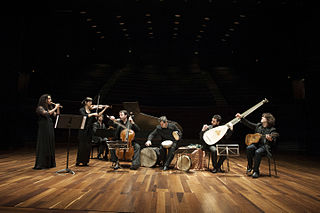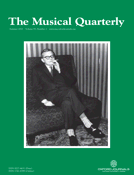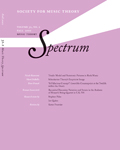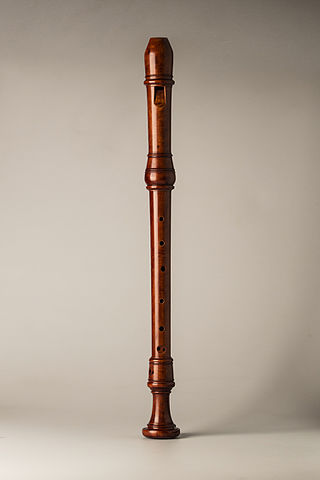
Early music generally comprises Medieval music (500–1400) and Renaissance music (1400–1600), but can also include Baroque music (1600–1750). Originating in Europe, early music is a broad musical era for the beginning of Western classical music.

Historically informed performance is an approach to the performance of classical music, which aims to be faithful to the approach, manner and style of the musical era in which a work was originally conceived.
Gustave Reese was an American musicologist and teacher. Reese is known mainly for his work on medieval and Renaissance music, particularly with his two publications Music in the Middle Ages (1940) and Music in the Renaissance (1954); these two books remain the standard reference works for these two eras, with complete and precise bibliographical material, allowing for almost every piece of music mentioned to be traced back to a primary source.
Manfred Fritz Bukofzer was a German-born American musicologist.

In English early Baroque music, a broken consort is an ensemble featuring instruments from more than one family, for example a group featuring both string and wind instruments. A consort consisting entirely of instruments of the same family, on the other hand, was referred to as a "whole consort", though this expression is not found until well into the seventeenth century. The word "consort", used in this way, is an earlier form of "concert", according to one opinion, while other sources hold the reverse: that it comes from the French term concert or its Italian parent term concerto, in its sixteenth-century sense. Matthew Locke published pieces for whole and broken consorts of two to six parts as late as 1672.

The Musical Quarterly is the oldest academic journal on music in America. Originally established in 1915 by Oscar Sonneck, the journal was edited by Sonneck until his death in 1928. Sonneck was succeeded by a number of editors, including Carl Engel (1930–1944), Gustave Reese (1944–45), Paul Henry Lang (1945–1973), Joan Peyser (1977–1984), and Eric Salzman (1984–1991).
Jonathan Bellman is a musicologist and pianist currently employed at the University of Northern Colorado. He is noted for his research on exoticism and music.

19th-Century Music is a triennial academic journal that "covers all aspects of Western art music composed in, leading to, or pointing beyond the "long century" extending roughly from the 1780s to the 1930s." It is published by the University of California Press and was established in 1977. The editor-in-chief is Lawrence Kramer.

Music Theory Spectrum is a peer-reviewed, academic journal specializing in music theory and analysis. It is the official journal of the Society for Music Theory, and is published by Oxford University Press. The journal was first published in 1979 as the official organ of the Society for Music Theory, which had been founded in 1977 and had its first conference in 1978. Unlike many other journals, Music Theory Spectrum was initially published in an oblong (landscape) page format, to better accommodate such musical graphics as Schenkerian graphs.
George Michael Sinclair Kennedy CBE was an English music critic and author who specialized in classical music. For nearly two decades he was the chief classical music critic for both The Daily Telegraph (1986–2005) and The Sunday Telegraph (1989–2005). A prolific writer, he was the biographer of many composers and musicians, including Vaughan Williams, Elgar, Barbirolli, Mahler, Strauss, Britten, Boult and Walton. Other notable publications include writings on various musical institutions, the editing of music dictionaries as well as numerous articles for The New Grove Dictionary of Music and Musicians and the subsequent Grove Music Online.

The Journal of Forestry is the primary scholarly journal of the Society of American Foresters. It aims to advance the forestry profession by keeping professional foresters informed about developments and ideas related to the practice of forestry. The journal publishes editorials and technical content related to the management of forests and related natural resources. Articles are generally written for an audience of natural resources professionals, with topics spanning the many facets or disciplines of forestry. The Journal is currently edited by Keith A. Blatner. According to the Journal Citation Reports, its 2018 impact factor is 2.675.
Music & Letters is an academic journal published quarterly by Oxford University Press with a focus on musicology. The journal sponsors the Music & Letters Trust, which makes twice-yearly cash awards of variable amounts to support research in the music field.

The voice flute (also the Italian flauto di voce and the French flûte de voix are found in English-language sources) is a recorder with the lowest note of D4, and is therefore intermediate in size between the alto and tenor recorders.

Francis William Galpin was an English cleric and antiquarian musicologist. He was known as a collector of old musical instruments.
Elizabeth Eva Leach is a British musicologist and music theorist who specializes in medieval music, especially that of the fourteenth century. Much of her scholarship concerns the life and work of Guillaume de Machaut.
Anthony Jennings was a New Zealand harpsichordist, organist, choral and orchestral director, and academic. A proponent of the early-music movement, he advocated for authentic performing practices. He made several recordings of baroque music on the harpsichord. Musicologist J. M. Thomson wrote, that Jennings's "musical skills were wide-ranging and supported by a charismatic personality. A virtuoso organist, his performances of Romantic and contemporary repertory are remembered for their technical brilliance and musical power, but his special contribution was in the area of Baroque performance."

The American Institute of Musicology (AIM) is a musicological organization that researches, promotes and produces publications on early music. Founded in 1944 by Armen Carapetyan, the AIM's chief objective is the publication of modern editions of medieval, Renaissance and early Baroque compositions and works of music theory. The breadth and quality of publications produced by the AIM constitutes a central contribution to the study, practice and performance of early music.

Trevor Noël Goodwin was an English music critic, dance critic and author who specialized in classical music and ballet. Described as having a "rare ability to write about music and dance with equal distinction", for 22 years Goodwin was Chief music and dance critic for the Daily Express. He held criticism posts at many English newspapers, including the News Chronicle, Truth and The Manchester Guardian among others; from 1978 to 1998 he also reviewed performances for The Times. Goodwin wrote an early history of the Scottish Ballet and was coauthor for two books: London Symphony: Portrait of an Orchestra with Hubert J. Foss and a Knight at the Opera with Geraint Evans.
Geoffrey Norris is an English musicologist and music critic. His scholarship focuses on Russian composers; in particularly, Norris is a leading scholar on the life and music of Sergei Rachmaninoff, about whom he has written in numerous articles and a 1976 book-length study. He was chief classical music critic of The Daily Telegraph from 1995 to 2009.
John Mansfield Thomson was a New Zealand musicologist who specialized in early music and the Music of New Zealand. He is known for founding the Early Music journal and publication on his country's music, such as the 1991 The Oxford History of New Zealand Music. Grove Music Online describes him as "One of New Zealand’s leading musicologists, [whose] publications on the country’s musical history set benchmarks of accuracy, style and vitality".











